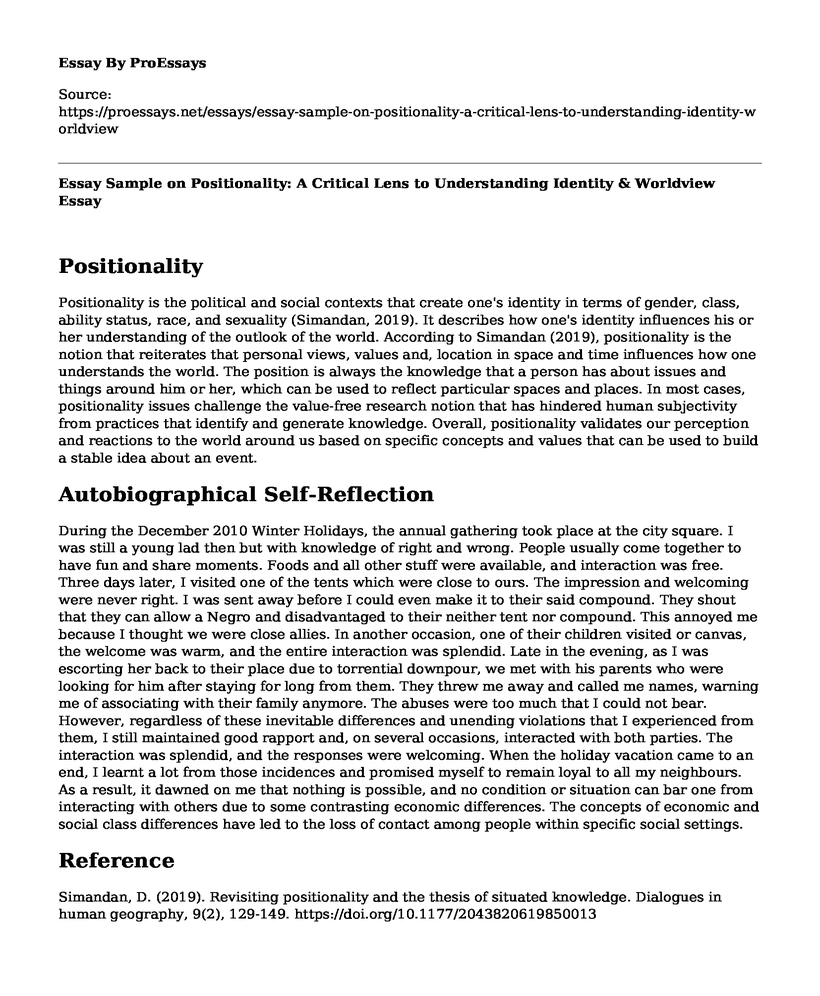Positionality
Positionality is the political and social contexts that create one's identity in terms of gender, class, ability status, race, and sexuality (Simandan, 2019). It describes how one's identity influences his or her understanding of the outlook of the world. According to Simandan (2019), positionality is the notion that reiterates that personal views, values and, location in space and time influences how one understands the world. The position is always the knowledge that a person has about issues and things around him or her, which can be used to reflect particular spaces and places. In most cases, positionality issues challenge the value-free research notion that has hindered human subjectivity from practices that identify and generate knowledge. Overall, positionality validates our perception and reactions to the world around us based on specific concepts and values that can be used to build a stable idea about an event.
Autobiographical Self-Reflection
During the December 2010 Winter Holidays, the annual gathering took place at the city square. I was still a young lad then but with knowledge of right and wrong. People usually come together to have fun and share moments. Foods and all other stuff were available, and interaction was free. Three days later, I visited one of the tents which were close to ours. The impression and welcoming were never right. I was sent away before I could even make it to their said compound. They shout that they can allow a Negro and disadvantaged to their neither tent nor compound. This annoyed me because I thought we were close allies. In another occasion, one of their children visited or canvas, the welcome was warm, and the entire interaction was splendid. Late in the evening, as I was escorting her back to their place due to torrential downpour, we met with his parents who were looking for him after staying for long from them. They threw me away and called me names, warning me of associating with their family anymore. The abuses were too much that I could not bear. However, regardless of these inevitable differences and unending violations that I experienced from them, I still maintained good rapport and, on several occasions, interacted with both parties. The interaction was splendid, and the responses were welcoming. When the holiday vacation came to an end, I learnt a lot from those incidences and promised myself to remain loyal to all my neighbours. As a result, it dawned on me that nothing is possible, and no condition or situation can bar one from interacting with others due to some contrasting economic differences. The concepts of economic and social class differences have led to the loss of contact among people within specific social settings.
Reference
Simandan, D. (2019). Revisiting positionality and the thesis of situated knowledge. Dialogues in human geography, 9(2), 129-149. https://doi.org/10.1177/2043820619850013
Cite this page
Essay Sample on Positionality: A Critical Lens to Understanding Identity & Worldview. (2023, Mar 28). Retrieved from https://proessays.net/essays/essay-sample-on-positionality-a-critical-lens-to-understanding-identity-worldview
If you are the original author of this essay and no longer wish to have it published on the ProEssays website, please click below to request its removal:
- American Policies and Actions 1945-1975 Essay
- Arctic Council International Government Organization Paper Example
- Exploring Socialism's Impact on Humanity: A Family Story - Essay Sample
- Essay on Andrew Falce Explores What Defines a Superpower Nation
- America's Homeless Crisis: Half a Million People Sleep Homeless Every Night - Essay Sample
- Marxism: A Revolutionary Social-Economic Analysis Approach - Free Essay Sample
- Journey Toward a Doctorate: Bridging Educational Inequality in Developing Countries - Paper Example







